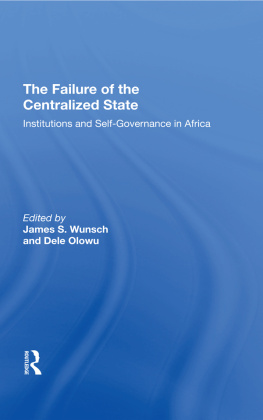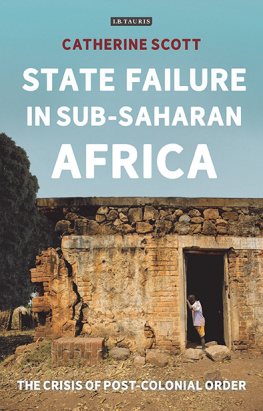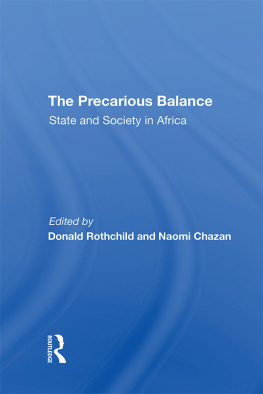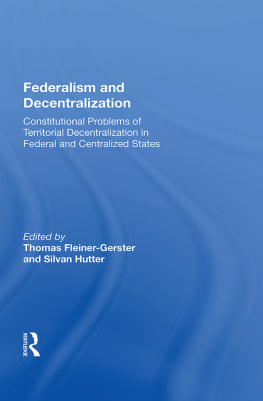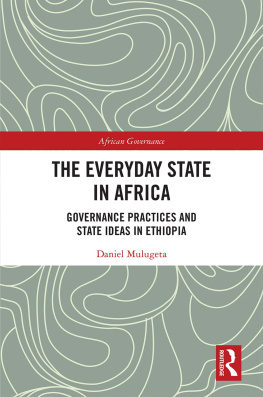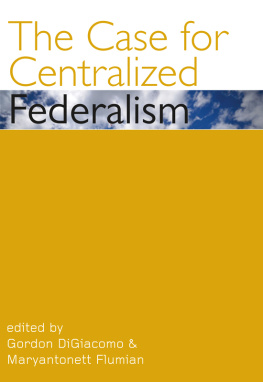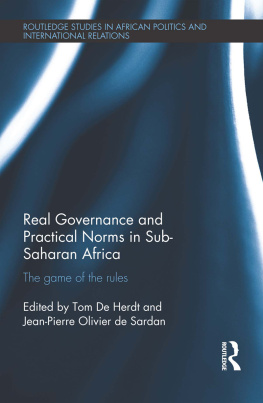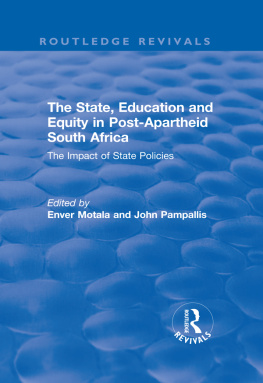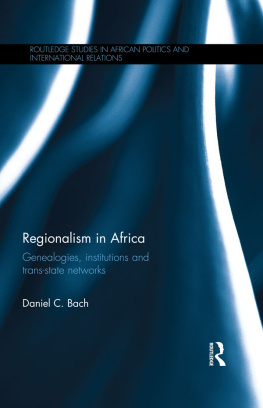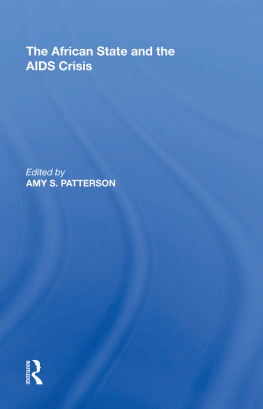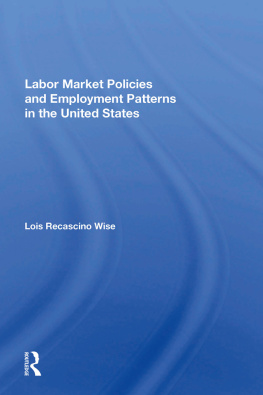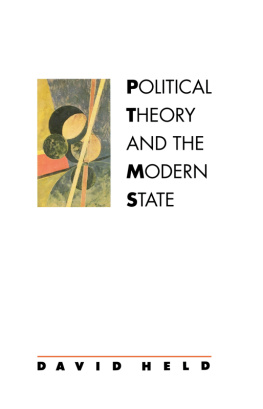First published 1990 by Westview Press
Published 2019 by Routledge
52 Vanderbilt Avenue, New York, NY 10017
2 Park Square, Milton Park, Abingdon, Oxon OX14 4RN
Routledge is an imprint of the Taylor & Francis Group, an informa business
Copyright 1990 Taylor & Francis
All rights reserved. No part of this book may be reprinted or reproduced or utilised in any form or by any electronic, mechanical, or other means, now known or hereafter invented, including photocopying and recording, or in any information storage or retrieval system, without permission in writing from the publishers.
Notice:
Product or corporate names may be trademarks or registered trademarks, and are used only for identification and explanation without intent to infringe
Library of Congress Cataloging-in-Publication Data
The Failure of the centralized state.
(Westview special studies on Africa)
Includes bibliographies and index.
1. AfricaPolitics and government19451960.
2. AfricaPolitics and government1960
3. Decentralization in governmentAfrica. 4. Africa
Economic policy. I. Wunsch, James S. (James
Stevenson), 1946 . II. Olowu, Dele. III. Series.
JQ1875.A1F35 1990 960.32 86-32516
ISBN 13: 978-0-367-29204-1 (hbk)
This book grew out of the intellectual exchanges in which we participated at the Workshop in Political Theory and Policy Analysis at Indiana University, Bloomington, Indiana, during the 1985/86 academic year. That workshop was (and is still) led jointly by Vincent and Elinor Ostrom and included approximately a dozen other scholars from several disciplines from Western Europe, Asia, Latin America, Eastern Europe (Poland and Yugoslavia), and the United States. In this multi-national and multi-disciplinary environment, we were led to reexamine and reintegrate our previous research and teaching on African politics and public administration. Repeatedly we sought to make sense of the crisis we see currently in Africa. The idea for this book developed in this context and was guided and molded by the analytical frameworks used at the workshop. Particularly important to us has been a principle, we daresay, implicit in all the workshop has done: human beings can govern themselves in peace and dignity, though the pathway to such a world is one requiring care, thought, willingness to trust the people with their own governance, and increased attention to the origin, role, and nature of human institutions.
Colleagues at the workshop contributed immensely to the development of our work. As well as helping to frame our agenda of issues, their criticism helped in its development. While everyone there deserves our appreciation, we are particularly grateful to Roger Parks of the School of Public and Environmental Affairs (SPEA) at Indiana University, Peter Bogason of the Institute of Political Studies in Denmark, Susan Wynne of the workshop at Indiana, and, of course, Vincent and Elinor Ostrom. We are also indebted to others who have helped us with their support and criticisms, including particularly Thomas Mans of Creighton University, Donald Rothchild of the University of California, Davis, and Catherine Newbury at the University of North Carolina. Patrick OMeara, the director of the African Studies Program at Indiana University, read the first drafts of several chapters of the book and gave very helpful comments. Our contributors to this volume also deserve our deep gratitude: for their excellent chapters, of course, but just as much for their excellent criticism of our chapters. The latter added much of value to the book. John Harbeson of CUNY and Sheldon Gellar of Michigan State University are to be much thanked for their persistent, ever courteous, ever valuable, almost co-editorial efforts.
Westview Press encouraged the completion of the book through their editorial personnels patience and careful attention to technical details. We particularly thank our editor, Barbara Ellington. Our two universities, Creighton University, Omaha, Nebraska, and the Obafemi Awolowo University, Nigeria, assisted the work by releasing us for the academic year of 1985/86 to enable us to spend our sabbatical leave developing the project. In this respect we are grateful to our respective deans (William Cunningham and A. O. Sanda) and presidents (Michael Morrison, S.J., and W. Abimbola) for making this arrangement possible. Dean Michael Lawler of Creighton Universitys Graduate School, furthermore, helped with several grants which supported the completion of the manuscript.
The typing, corrections, and final reproduction of the manuscript were made possible by the tremendous secretarial assistance we received from the Workshop in Political Theory in Bloomington, as well as from our respective departments at Obafemi Awolowo and Creighton. We especially appreciate the time and talent of Kristin Crose and Patty Zielinski of the Workshop in Political Theory. Sincere thanks also go to Helen Schaefer of the Political Science Department at Creighton for her careful secretarial assistance, as well as to her numerous student assistants. We are also indebted to Kent Day of Omaha for his help in proofreading the manuscript.
Our wives, Mary and Bukky, had to suffer our sometimes lengthy absences from home while we were working on the book. We both feel lucky to be married to such patient women who gave their support to the enterprise from beginning to end.
The work is dedicated to Vincent and Elinor Ostrom. The theory which informs the work is based largely on their work. They have read, re-read, and helped strengthen several chapters of the book. Both of us and several of the contributors to this volume have at one time or another benefited from the strength of their scholarship and the warmth of their friendship. While acknowledging their assistance and that of others not mentioned here, we hasten to add that we are solely responsible for the ideas expressed in the book. Whatever its shortcomings, they are ours.
James S. Wunsch
Dele Olowu
1
The Failure of the Centralized African State
James S. Wunsch and Dele Olowu
Introduction
Nearly thirty years ago in Accra, Ghana, Africas march to independence began. With substantial cash reserves, a strong domestic agricultural economy, a skilled and professionalized civil service, a popular leader, and an apparently well-functioning, competitive-party, parliamentary system, hope for the future was bright.
Today, these hopes have faded. The economy is at present only beginning a recovery from collapse and near bankruptcy. Its GNP declined at an average of 1.3 percent each year from 1960 to 1982, and its average inflation rate was 34.8 percent annually over the same period (World Bank 1984b). Five military coups have buffeted Ghanaians political hopes, which had twice risen since the first coup in 1966 on the backs of two now-discarded constitutions. The civil service has been demoralized by political instability and military intervention, and the economy has been devastated by incredible inflation rates. Many of the best trained and skilled personnel have left the country. One wonders, why?

